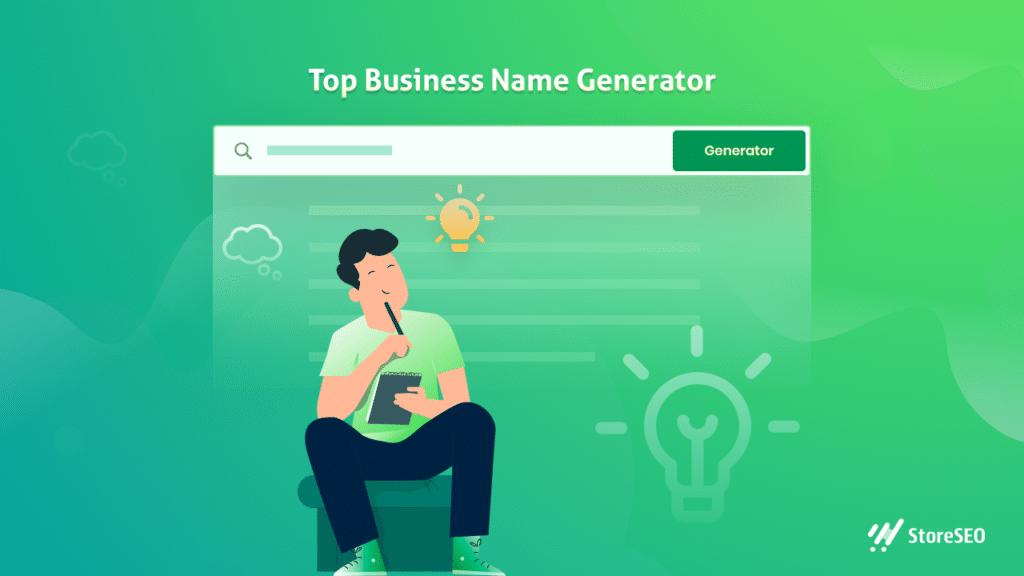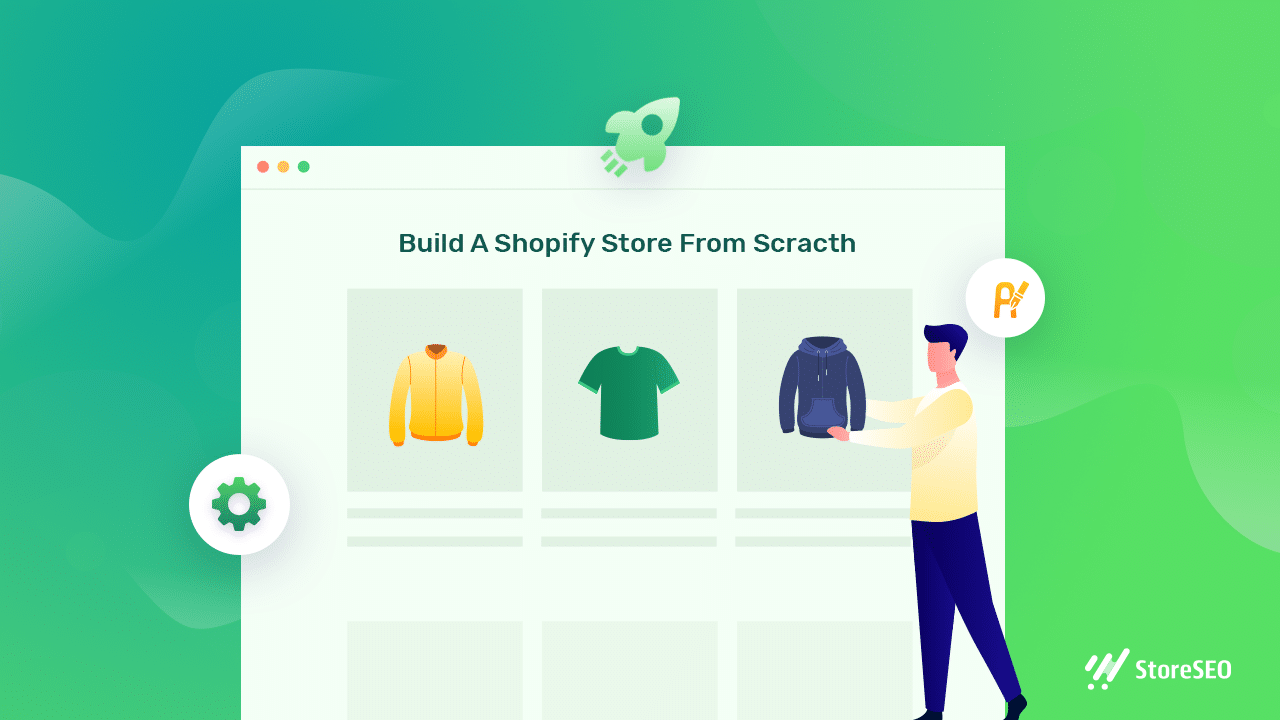अपना ईकॉमर्स व्यवसाय शुरू करना रोमांचक हो सकता है, लेकिन केवल तभी जब आपको शुरू करने का सही तरीका पता हो। उचित मार्गदर्शन के बिना, आप गलती से अपने व्यवसाय को सफलता के बजाय विफलता के लिए तैयार कर सकते हैं। इसीलिए हमने आपकी मदद करने के लिए एक बेहतरीन, व्यापक गाइड तैयार की है Shopify स्टोर बनाएं शुरूुआत से।
![How To Build A Shopify Store From Scratch [In 30 Minutes]](https://storeseo.com/wp-content/uploads/2022/02/How-to-build-a-Shopify-Store-From-Scratch-In-30-Minutes-1024x576.png)
साथ Shopify सबसे आसान और सबसे लोकप्रिय ईकॉमर्स समाधानों में से एक होने के नाते, आप आसानी से बिना किसी परेशानी के एक नया व्यवसाय शुरू कर सकते हैं। इस गाइड में, हम आपको दिखाएंगे कि आप 30 मिनट से कम समय में अपना Shopify स्टोर कैसे बना सकते हैं।
अपने ईकॉमर्स स्टोर के लिए Shopify क्यों चुनें?
अपना ई-कॉमर्स व्यवसाय शुरू करते समय, सही प्लेटफ़ॉर्म चुनने से आपको यह सुनिश्चित करने में मदद मिल सकती है कि आप अपने व्यवसाय को सफलता के लिए तैयार कर रहे हैं। Shopify ऑनलाइन स्टोर शुरू करने के लिए सबसे अच्छे ई-कॉमर्स प्लेटफार्मों में से एक है।
चाहे आप एक्सेसरीज़, कपड़े, फूल बेच रहे हों या फिर अमूर्त सेवाएँ दे रहे हों, Shopify कई ऐसी सुविधाओं के साथ आता है जो आपके व्यवसाय को शुरू करना आसान बनाती हैं। उदाहरण के लिए, आप आसानी से मोबाइल अनुकूल Shopify स्टोर बनाएं ताकि ग्राहक किसी भी डिवाइस से आपके उत्पादों तक पहुंच सकें और उन्हें देख सकें। इसके अलावा, Shopify आपको संवेदनशील वित्तीय डेटा को सुरक्षित रखने के साथ-साथ विश्वसनीय, सुरक्षित भुगतान गेटवे प्रदान करने में भी सहायता करेगा।
यदि आप अभी भी निश्चित नहीं हैं, तो इस पोस्ट को देखें लोग Shopify क्यों चुनते हैं अपना ऑनलाइन स्टोर शुरू करने के लिए आपको क्या करना चाहिए, और आपको भी ऐसा क्यों करना चाहिए।
अपना Shopify स्टोर शुरू करने से पहले करने योग्य चीज़ें
इससे पहले कि हम स्क्रैच से Shopify स्टोर बनाने के लिए ट्यूटोरियल में गोता लगाएँ, आइए कुछ बुनियादी, आवश्यक कार्यों को कवर करें जिन्हें आपको पहले करने की आवश्यकता होगी।
1. अपना उद्योग चुनें और लक्षित ग्राहकों की पहचान करें
अपना Shopify स्टोर शुरू करने से पहले आपको जो पहला कदम उठाना चाहिए वह है कौन सा उद्योग चुनना है आप किसकी सेवा करना चाहते हैं। शुरुआत से ही यह निर्धारित करने से आपको अपने व्यवसाय के लिए सही मार्केटिंग रणनीतियों की योजना बनाने और सही निर्णय लेने में मदद मिलेगी ताकि आपका ऑनलाइन स्टोर स्थायी रूप से बढ़ सके।
![How To Build A Shopify Store From Scratch [In 30 Minutes]](https://storeseo.com/wp-content/uploads/2022/02/10_Interesting_eCommerce_Personalization_To_Increase_Sales.png)
इसके अलावा, जब आप जानते हैं कि आप किस उद्योग को सेवा देना चाहते हैं, तो आप अपने लक्षित ग्राहकों को अधिक आसानी से पहचान पाएंगे। यह जानना कि आपके संभावित ग्राहक कौन हैं, आपको उनके लिए अपनी पेशकशों को विशेष रूप से तैयार करने में मदद करेगा, और प्रभावी तरीके से अपनी बिक्री को बढ़ाएगा। ईकॉमर्स निजीकरण रणनीतियाँ.
अपने प्रतिस्पर्धियों के बारे में विस्तृत जानकारी एकत्र करें
अपने लक्षित बाजार का चयन करने के बाद, आपको अपने प्रतिस्पर्धियों पर शोध करना होगा और उनके बारे में सभी प्रासंगिक जानकारी प्राप्त करनी होगी। आपको यह जानना होगा कि उनका अद्वितीय विक्रय प्रस्ताव क्या है, उनके प्रतिस्पर्धी लाभ क्या हैं, उनकी मूल्य निर्धारण रणनीतियाँ क्या हैं ताकि आप उसके अनुसार तैयारी और योजना बना सकें।
अपनी ब्रांड पहचान तय करें और अपना व्यवसाय नाम चुनें
एक बार जब आप अपने लक्षित बाजार और प्रतिस्पर्धियों को जान लेते हैं, तो यह आपके लिए समय है अपना व्यवसाय नाम चुनेंऐसा करने के लिए, आपको सबसे पहले अपनी ब्रांड पहचान और व्यक्तित्व की पहचान करनी होगी, और फिर एक ऐसा व्यवसाय नाम चुनना होगा जो आपके ब्रांड को पूरी तरह से प्रतिबिंबित करता हो।

व्यवसाय का नाम चुनना कोई आसान काम नहीं है, और इसमें कई सत्रों का विचार-विमर्श, साथ ही निर्णय लेने से पहले सावधानीपूर्वक योजना बनाना शामिल है। आखिरकार, आपको यह सुनिश्चित करने की ज़रूरत है कि आपका व्यवसाय नाम आपके ब्रांड से मेल खाता हो, यादगार हो, और अद्वितीय भी हो और डोमेन पंजीकरण के लिए उपलब्ध हो।
शुक्र है, आपके ऑनलाइन स्टोर के लिए सही ईकॉमर्स व्यवसाय नाम चुनने में आपकी मदद करने के लिए बहुत सारे लोकप्रिय व्यवसाय नाम जनरेटर उपलब्ध हैं। इस विस्तृत गाइड को देखें कि कैसे अपने ईकॉमर्स व्यवसाय को नाम दें अधिक विचारों के लिए.
अपने Shopify व्यवसाय के लिए एक अद्वितीय डोमेन नाम पंजीकृत करें
![How To Build A Shopify Store From Scratch [In 30 Minutes]](https://storeseo.com/wp-content/uploads/2022/02/screely-1644225648962.png)
एक बार जब आप अपने व्यवसाय के लिए नाम चुन लेते हैं, तो पंजीकरण करने का समय आ जाता है। अद्वितीय डोमेन नाम Shopify पर। आप बिना किसी परेशानी के आसानी से कस्टम डोमेन नाम रजिस्टर कर सकते हैं Shopify की अंतर्निहित विशेषताएं; आप न केवल Shopify के साथ उपलब्ध डोमेन की तलाश कर सकते हैं, बल्कि आप एक प्राथमिक डोमेन नाम भी पंजीकृत कर सकते हैं, उपडोमेन प्रबंधित कर सकते हैं, एक अंतरराष्ट्रीय डोमेन जोड़ सकते हैं और बहुत कुछ कर सकते हैं।
अपना Shopify स्टोर कैसे बनाएं: पूर्ण विवरण
यदि आपने उपरोक्त चरणों को पूरा कर लिया है, तो अब आप अपना खुद का Shopify स्टोर बनाने के लिए तैयार हैं। इस अनुभाग में, हम आपको नीचे दिए गए पूर्ण, चरण-दर-चरण वॉकथ्रू को दिखाने जा रहे हैं ताकि आप अपना Shopify स्टोर स्क्रैच से बना सकें।
चरण 1: अपना Shopify खाता बनाएँ
सबसे पहले और सबसे महत्वपूर्ण बात, आपको अपना Shopify अकाउंट बनाना होगा। अपना खुद का व्यवसाय शुरू करने के लिए, Shopify आपको सभी सुविधाओं की जांच करने और उन्हें मुफ़्त में आज़माने के लिए 14 दिन का निःशुल्क परीक्षण प्रदान करता है। बस यहाँ जाएँ शॉपिफ़ाई का होमपेज और पर क्लिक करें 'निशुल्क आजमाइश शुरु करें' जैसा कि नीचे दिखाया गया है, ऊपरी दाएं कोने पर स्थित बटन पर क्लिक करें।
एक पॉपअप दिखाई देगा जहाँ आपको अपना निःशुल्क परीक्षण शुरू करने के लिए अपना ईमेल पता प्रदान करना होगा। एक बार परीक्षण अवधि समाप्त हो जाने के बाद, आप अपने व्यवसाय की ज़रूरतों के हिसाब से Shopify प्लान चुन सकते हैं।
ऐसा इसलिए है क्योंकि Shopify एक पर काम करता है “अभी खरीदें, बाद में भुगतान करें” मॉडल जो तब उपयोगी हो सकता है जब आप अभी शुरुआत कर रहे हों। आप इंटरफ़ेस से खुद को परिचित कर पाएंगे और सुविधाओं के बारे में विस्तार से जान पाएंगे, और फिर तय कर पाएंगे कि कौन सा Shopify प्लान आपके लिए सबसे अच्छा होगा।
नीचे, आप सभी उपलब्ध Shopify योजनाओं की जांच कर सकते हैं, और प्रत्येक योजना आपके ईकॉमर्स स्टोर के लिए अलग-अलग सुविधाएं प्रदान करती है।
इसके बाद, Shopify आपसे अपना ऑनलाइन स्टोर सेट अप करने में मदद के लिए कुछ सवाल पूछेगा। आप देखेंगे कि इस चरण के दौरान, Shopify आपको यह विकल्प देता है कई बिक्री चैनल पहले से स्थापित करें फेसबुक, गूगल, शॉपिफाई शॉप बटन और इंस्टाग्राम के माध्यम से आपके लिए। ये सेटिंग्स पूरी तरह से वैकल्पिक हैं, लेकिन यह निश्चित रूप से कई चैनलों पर बिक्री की पूरी प्रक्रिया को आसान बनाता है।
इसके बाद, आपको अपने व्यवसाय के बारे में विवरण जैसे कि आपका पता, देश और क्षेत्र, तथा अन्य विवरण जोड़ने होंगे।
चरण 2: अपना Shopify स्टोर कस्टमाइज़ करें और उत्पाद जोड़ें
एक बार जब आप सभी आवश्यक विवरण जोड़ लेते हैं, तो Shopify आपको आपके नए बनाए गए स्टोर पर रीडायरेक्ट कर देगा। डिफ़ॉल्ट रूप से, यह वह पेज है जिसे आप देखेंगे। यहां, आपको उत्पाद जोड़ने, Shopify ऐप इंस्टॉल करने और अन्य स्टोर प्रबंधन सेटिंग्स के लिए कई विकल्प मिलेंगे।
यहाँ से, आप पर क्लिक कर सकते हैं 'उत्पाद' बाएं हाथ के साइडबार से विकल्प चुनें, और अपने उत्पादों को अपने Shopify स्टोर में जोड़ें। आप पर क्लिक करके एक नया उत्पाद बना पाएंगे 'अपने उत्पाद जोड़ें' बटन पर क्लिक करें, या पृष्ठ के शीर्ष पर 'आयात करें' बटन पर क्लिक करके अपने उत्पादों की CSV फ़ाइल आयात करें।
एक बार जब आप इस बटन पर क्लिक करते हैं, तो आप अपने उत्पाद के लिए नाम जोड़ सकते हैं, अपने उत्पाद का विवरण लिख सकते हैं, चित्र, मूल्य निर्धारण, सूची जानकारी, वजन और अन्य सभी आवश्यक विवरण जोड़ सकते हैं।
इन सरल चरणों के साथ आप आसानी से अपने Shopify स्टोर में कोई भी उत्पाद जोड़ सकते हैं और अपना व्यवसाय शुरू कर सकते हैं। आप जब चाहें अपने उत्पादों को केवल कुछ क्लिक के साथ अपडेट भी कर सकते हैं।
इसके अलावा, आप बिना किसी कोडिंग के आसानी से अपने Shopify स्टोर को कस्टमाइज़ भी कर सकते हैं। अपने डैशबोर्ड से, पर क्लिक करें 'ऑनलाइन स्टोर' बाएं हाथ के साइडबार से विकल्प चुनें। यह आपको आपके स्टोर के होमपेज पर ले जाएगा।
यहां, आप क्लिक कर सकते हैं 'संपादन करना' अपने स्टोर के हर हिस्से के स्वरूप को अनुकूलित करने के लिए पृष्ठ के निचले भाग में विकल्प - लेआउट, रंग, टाइपोग्राफी और बहुत कुछ।
चरण 3: SEO के लिए अपने Shopify स्टोर को अनुकूलित करें
अपने सभी उत्पादों को जोड़ने और अपने स्टोर की उपस्थिति को अनुकूलित करने के बाद, आपको अपने ईकॉमर्स व्यवसाय को सही SEO प्रथाओं के साथ अनुकूलित करने के लिए कुछ समय लेना चाहिए। यह महत्वपूर्ण है क्योंकि SEO के लिए अपने उत्पादों को अनुकूलित करने से आपके संभावित ग्राहकों को विशिष्ट खोज शब्दों के लिए आपके उत्पादों को खोजने में मदद मिलेगी।
अगर आप सुनिश्चित नहीं हैं कि SEO के लिए अपने उत्पादों को कैसे अनुकूलित करें, तो चिंता न करें। इसे देखें Shopify SEO पर उपयोगी मार्गदर्शिका यह जानने के लिए कि कैसे अपने उत्पादों को गूगल जैसे खोज इंजनों पर उच्च रैंक दिलाएं और अपने व्यवसाय के लिए ट्रैफ़िक और बिक्री बढ़ाएं।
![How To Build A Shopify Store From Scratch [In 30 Minutes]](https://storeseo.com/wp-content/uploads/2022/02/Getting-Started-With-StoreSEO-Complete-Guide-for-Shopify-SEO-1-1024x576.png)
Shopify अपने खुद के बिल्ट-इन फीचर्स के साथ आता है जो आपको सही SEO प्रथाओं के साथ अपने स्टोर को ऑप्टिमाइज़ करने में मदद करता है। हालाँकि, यदि आप एक कदम आगे जाना चाहते हैं, तो आप हमेशा इसका उपयोग कर सकते हैं स्टोरएसईओ- शॉपिफाई के लिए एक उन्नत एसईओ समाधान जो एसईओ मुद्दों के लिए आपके ऑनलाइन स्टोर को स्कैन करता है और आपको कुछ क्लिकों के साथ उन्हें ठीक करने में मदद करता है।
![How To Build A Shopify Store From Scratch [In 30 Minutes]](https://storeseo.com/wp-content/uploads/2022/02/screely-1644225948584-1024x492.png)
चरण 4: अपनी Shopify भुगतान विधियाँ सेट करें
यह अगला कदम किसी भी ऑनलाइन व्यवसाय के लिए बेहद महत्वपूर्ण है। आखिरकार, बिक्री करने के लिए, आपको एक सुरक्षित, विश्वसनीय भुगतान गेटवे और लचीले भुगतान के तरीके प्रदान करने की आवश्यकता होगी।
इसलिए, जैसे ही आप उत्पादों को जोड़ना, उन्हें एसईओ के साथ अनुकूलित करना और अपने स्टोर को अनुकूलित करना समाप्त कर लें, आपको अपनी भुगतान विधियों को सेट करने पर ध्यान केंद्रित करना चाहिए।
शॉपिफ़ाई अपने स्वयं के सुरक्षित भुगतान गेटवे के साथ आता है, जिसे शॉपिफ़ाई पेमेंट्सयह Shopify व्यापारियों द्वारा उपयोग की जाने वाली सबसे लोकप्रिय भुगतान विधि है, लेकिन इससे पहले कि आप इसे अपनी भुगतान विधि के रूप में चुनें, आपको कुछ महत्वपूर्ण कारकों पर विचार करना चाहिए। इसे पढ़ें विस्तृत गाइड यहाँ समझने के लिए अगर शॉपिफ़ाई पेमेंट्स आपके व्यवसाय के लिए सही विकल्प है.
![How To Build A Shopify Store From Scratch [In 30 Minutes]](https://storeseo.com/wp-content/uploads/2022/02/screely-1644226146386-1024x567.png)
चरण 5: समस्याओं की पहचान करने के लिए अपने Shopify स्टोर का परीक्षण करें
एक बार जब आप अपना Shopify स्टोर सेट कर लेते हैं, तो आपको किसी भी समस्या की पहचान करने और उन्हें तुरंत ठीक करने के लिए अपने ऑनलाइन स्टोर का अच्छी तरह से परीक्षण करना चाहिए। इसमें आपके भुगतान के तरीके, उत्पाद पृष्ठ, एकल उत्पाद पृष्ठ, आपके FAQ और यहां तक कि संपर्क पृष्ठों का परीक्षण करना शामिल है।
इस दौरान आपको अपना परीक्षण भी करना चाहिए। स्टोर की मोबाइल प्रतिक्रियाशीलता और सुनिश्चित करें कि आपका स्टोर सभी स्क्रीन आकारों पर आसानी से लोड हो।
अनुशंसित: ज़रूरी Shopify ऐप्स के साथ अपना व्यवसाय बढ़ाएँ
जबकि यह गाइड आपको आसानी से निर्माण करने में मदद करेगा शॉपिफ़ाई स्टोर शुरुआत से ही, आप पा सकते हैं कि अपने ईकॉमर्स व्यवसाय में ट्रैफ़िक और बिक्री बढ़ाने के लिए, आपको कुछ आवश्यक ऐप इंस्टॉल करने से फ़ायदा हो सकता है। कुछ चुनिंदा ऐप की इस सूची पर एक नज़र डालें सबसे ज़रूरी Shopify ऐप्स और जानें कि वे किस प्रकार आपके व्यवसाय को बिना किसी प्रयास के बढ़ाने में आपकी सहायता कर सकते हैं।
आज ही अपना Shopify स्टोर शुरू करें
Shopify पर अपना ईकॉमर्स व्यवसाय शुरू करने के लिए तैयार हैं? ऊपर दिए गए गाइड का पालन करें और नीचे कमेंट में हमें अपने विचार बताएं। इस तरह के और मज़ेदार ट्यूटोरियल के लिए, सुनिश्चित करें कि आप हमारे ब्लॉग की सदस्यता लें या हमारे मित्रतापूर्ण समूह में शामिल हों फेसबुक समुदाय.











